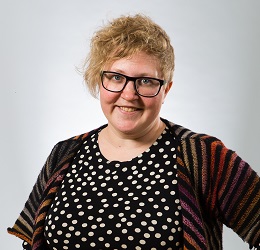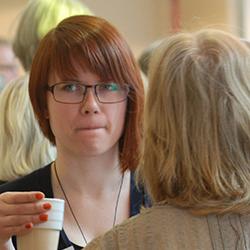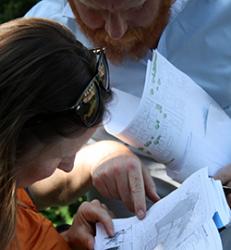Communicative Interfaces for planning

Defense of doctoral thesis
Swedish municipalities connect participation strategies to objectives concerning sustainable development, as we all need to be part of the solution when it comes to climate change and resource scarcity. The mandatory participatory meetings in municipal planning are criticized for being slow and inefficient and alternative, parallel methods of participation are called for. This is the starting point for Lisa Bomble’s doctoral thesis Communicative Interfaces for Planning – Social learning in participatory networks in a Swedish context.
Lisa Bomble is a PhD student at Chalmers University of Technology at the department of Architecture and she is one of the first Mistra Urban Futures PhD student to present and defend her work.
Which municipalities have you studied and why?
Both my cases have connections to a master studio at Chalmers Architecture (Design and Planning for Sustainable Development in a Local Context). An opportunity for further collaboration has been found in connection to my two case municipalities being the focus area for the studio. I started with a case study in Uddevalla municipality, where I helped develop a method for basing area analyses on interviews and participatory workshops. I was then part of an EU Inter-reg project Uddevalla had together with Fredrikstad in Norway, trying out participatory methods in municipal planning. From there I came to Lerum municipality, where the master studio visited in 2011-2012. We found a way to organize a place for me as an embedded researcher in Lerum, between the then quite newly established Mistra Urban Futures, teaching in the master studio and the municipality’s demand for support and assessments of their efforts towards a sustainable future.
What are your main findings?
Inhabitants see communication with the municipality as one ongoing communication, which means that continuity and mutual understanding of a local context is essential for any participatory setting. Inhabitants also express themselves in narratives where several municipal areas of responsibility are interlinked and I have shown that local knowledge is lost in interpretation as stories are heard by one set of expertise at a time. The co-production group in Gråbo/Lerum proved to be a good, though not perfect example, of a scale and setting where municipality and inhabitants meet and discuss the local context continuously and the inhabitants are then given the problem formulation prerogative. The network still develops and learns with each issue and I have not been able to show definitively that this common ground to base decision making processes or planning projects on leads to more efficient processes. But it is effective as municipal decisions concerning Gråbo are anchored in this common understanding and the inhabitants and local actors therefore have influence or power simply by being invited.
Could you give any advice for municipalities starting up a co-production process involving inhabitants?
Ask me to come and help? No, just joking.My advice is to not kill it before it flies. The start and first year(s) of a co-production structure are difficult. You deliberately put people with very different perspectives on the same issue at the same meeting table. Be prepared and have strategies for communication through conflict. And consider who you invite to that first meeting, and who does the inviting. The local contexts differ everywhere, so you need to set up a group that will develop constructively forward, without being an exclusive elite among the inhabitants, nor a hostile opponent to the municipality. To co-produce, you need to establish a group that becomes a non-hierarchical “us”.
How will you develop your research going forward?
I have been given the opportunity to try the Gråbo co-production model in Vänersborg municipality and in a very different area to Gråbo. I will focus on the early stages and initiation of co-production. Something I didn’t influence but only followed from the sidelines in Gråbo. I doubt we will come so far as to call it co-initiation, but I will study pitfalls and prerequisites for a successful start.
Lisa Bomble will present and defend her work on September 2, 13:00-15:00, Ekosalen, Eklandagatan 86, Göteborg. The opponent is prof. Ali Mandanipour, Newcastle University, School of Architecture, Planning and Landscape. Head supervisor and examiner is Björn Malbert, Professor Emeritus, Chalmers University of Technology, department of Architecture. Read more
Read more about Lisa Bomble's PhD project Planning in Dialogue (In English, Swedish presentation here)
Questions? Contact Lisa Bomble at lisa.bomble@chalmers.se







